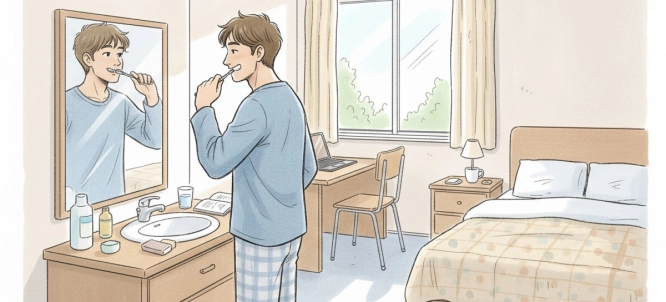Present Simple
Table of Contents
Exercises
Forms
Affirmative (Positive Sentences)
Use the verb in the base form (work, play, read).
Add -s / -es with he, she, it.
-
I drink tea in the morning.
-
They live near the park.
-
He reads before bed.
-
She goes to the gym.
-
It rains a lot here in April.
Negative Sentences
Use do not (don’t) with I, you, we, they.
Use does not (doesn’t) with he, she, it.
The main verb goes back to the base form.
-
I don’t watch TV at lunch.
-
We don’t drive to work.
-
He doesn’t eat sugar.
-
She doesn’t speak Korean.
-
It doesn’t look safe.
Questions
Put do or does at the beginning.
Then add the subject and the base verb.
-
Do you study online?
-
Do they open at 9?
-
Does he work on Saturdays?
-
Does she like jazz?
Wh- questions (with question words):
-
Where do you live?
-
Why do they meet here?
-
When does he start?
-
What music does she play?

Third person spelling rules
When the subject is he, she, it, verbs change:
-
Add -s: read - reads, play - plays
-
Add -es after ch, sh, ss, x, o: watch - watches, go - goes
-
Change y - ies after consonant: study - studies
-
Irregular: have - has
Special verb: to be
“Be” is different - it doesn’t use do/does. I am, You are, He/She/It is, We/They are
Negatives: am not, isn’t, aren’t
Questions: put the verb first (Am I…? Is she…? Are they…?)
Examples:
-
I’m ready. / I’m not ready. / Are you ready?
-
She’s a nurse. / She isn’t a nurse. / Is she a nurse?
When we use Present Simple
-
Habits & routines (things you do often):
I wake up at six. She takes the bus. -
Facts & truths (always true):
Water boils at 100°C. The sun rises in the east. -
Schedules (fixed times):
The museum opens at 10. The train leaves at 7:30. -
Instructions (steps, recipes):
Add salt, then stir. Press “Submit” to finish. -
Commentary & news headlines:
Striker scores again! Mayor announces new plan. -
States (feelings, opinions, needs):
I believe you. She prefers tea. They need help.
Time expressions
Common words with Present Simple:
-
always, usually, often, sometimes, rarely, never
-
every day / week / year
-
on Mondays / on Sundays
-
twice a week, three times a month
-
at weekends
Examples:
-
She usually studies in the evening.
-
We play football on Sundays.
-
He never drinks coffee.
